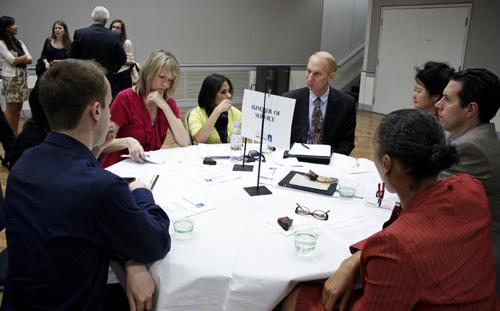
This post was written by Hatchet reporter Liza Dee.
The Innovation Task Force unveiled its top proposals Tuesday for the next phase of the University-wide cost-saving initiative, including pitches to expand online learning and alternative academic programs.
Students, faculty and staff discussed the 12 ideas, which ranged from online programs for veterans and high school students to a three-year graduation option, at a showcase in the Marvin Center.
The dozen proposals will be whittled down to six concrete plans over the next six months.
The event marked the fourth round of ideas since University President Steven Knapp created the Innovation Task Force in 2009 to build up enough savings for a $60 million annual investment in academics, student life and research after it first five years.
James Mahshie, a professor of speech and hearing sciences who helped lead the phase four innovation team, said while it was tough to keep up the momentum in another phase of the initiative, he was confident in the proposed ideas.
“To be honest, we sort of panicked,” Mahshie said. “We thought, ‘Oh God, all the good ideas have been taken.’ However, through the process of assembling the 13 people that were on this task force, we really started cranking. In the end, the 13 came up with 12 [ideas].”
Among the ideas introduced was a pre-health professional certificate program on the Virginia Science and Technology Campus, which would allow recent college graduates to take math and science credits before applying to medical, nursing or veterinary schools. The certificate program could add $1 million in revenue by bringing in students who would not count under the city-imposed enrollment cap.
Other revenue-generating proposals would seek to introduce the University to a wider audience. A Summer of Service program, estimated to provide $100,000 in revenue, would attract students from other universities to GW for a summer of volunteering and earning college credit in the D.C. area.
A plan to offer college courses to high school students, which estimated $2.5 million in revenue generation, would also look to enhance GW’s reputation by allowing students from all over to take GW classes online for transferable college credit.
Gary Naegel, the Graduate School of Education and Human Development’s director of personnel and finance, said the program would “get GW out of geographic zone that it’s been dependent on for the last couple of years,” referring to the reliance on key states like New York and New Jersey to feed applicants into the University.
The University could also save $480,000 by filling the 20 apartment units in Columbia Plaza that go unoccupied every month by targeting international students coming to the GW Law School.
The ITF’s first three phases of cost-saving ideas have already produced $43.4 million in annual savings, ITF co-chair Dave Lawlor said.
A second showcase – discussing the same ideas – will be held Thursday at the Virginia campus.



